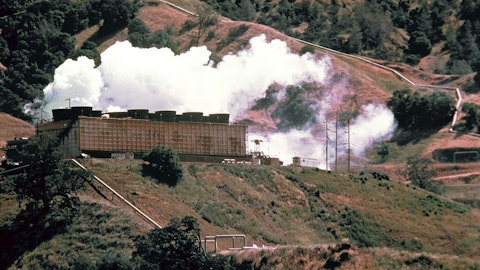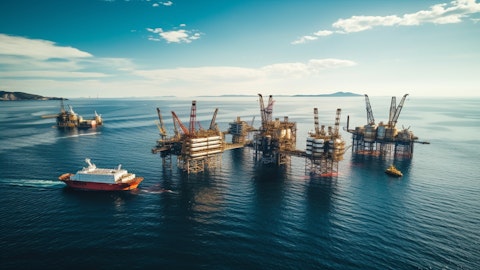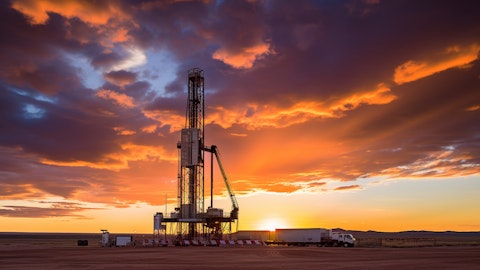Lorenzo Simonelli: Yes, very topical at the moment, Arun. And again, if you look at the aspect of LNG, no impact for us this year. And again, as you know, the project landscape and also the cycle of projects is multiyear. But I would say that, again, there is some uncertainty, in particular, on North America, given some of the discussions that are taking place and some of the delays in the permitting. I would also say I am disappointed that this is coming about right now. U.S. LNG is enormously beneficial to the U.S. economy. It’s had a large impact, beneficial impact on global energy markets, especially when you look at everything that’s happened in. There has been commitments made to providing LNG supply to many other countries.
And I think it’s important that we continue to go down that path, and it’s a matter of national security for many. And so we anticipate that this will work itself through, and we don’t anticipate that there will be any detrimental impact over the long-term to U.S. LNG. Outside of U.S. LNG though international projects continue to be buoyant, and there is several opportunities in the Middle East, you look at Africa, you look at Southeast Asia. And again, we have got an extensive reach on the international projects as well. So, no impact in ‘24 and continuing to monitor the situation in the U.S., but anticipate that will solve itself over the long-term.
Arun Jayaram: Great. Thanks Lorenzo.
Operator: Thank you. [Operator Instructions] Our next question comes from Saurabh Pant with Bank of America. You may proceed.
Saurabh Pant: Hi. Good morning Lorenzo and Nancy. Lorenzo, maybe I will start with a little more color on the aeroderivative side of things, the supply chain has been a topic. I think Nancy touched on that a little bit in her prepared remarks. But if you can give us a little more color on that, how are things going, if there is an update, and should we expect things to get better as we move through 2024?
Lorenzo Simonelli: Yes, sure. It’s something that we continue to navigate. I think externally, you see all the news around the aerospace supply chain and you have seen that we have managed it in 2023, and there will be no change to managing it in 2024 and that’s contemplated within the guidance that we provided. The situation remains stable, but will be tight through the end of 2024. And we are working closely with our supply base to make sure that we continue executing. It is tight, though, and we have incorporated that into the guidance that we have provided, but ensuring we don’t have any impact to our results.
Saurabh Pant: Okay. Fantastic. And then Nancy, maybe a quick follow-up for you. This kind of relates to what you asked earlier on. But you have been in the CFO role now since, I think late 2022. And we have heard you talk about organizational transformation and making Baker a leaner organization. And like you said, you have taken $150 million plus in cost out. Can you update, I know you talked about it a little bit, can you give us a little more color on what you plan to do going forward, and if there is any way to quantify the impact on that?
Nancy Buese: Yes. It’s a great question. And I would say in every aspect across the company, our focus is truly on operational excellence, execution and continuous improvement. Last year, we really laid the groundwork for improving that execution, accountability, transparency, and we did achieve that $150 million cost-out goal and that was really designed around sustainable structural changes that will benefit the organization longer term and will stick over time. And we have really begun the work as well as synchronizing many diverse systems, working towards efficient, streamlined processes and reporting everything from our underlying technology just to the way we do things. So, that’s permitting through the business, and we will create efficiencies over time.
We also have discrete projects, and I will give you one example. So, in 2023, we guided to a 35% to 40% tax rate, and this year, we are guiding to a 27% to 32% tax rate. And again, these things over time have a meaningful impact to our earnings done in a really structured, thoughtful way. So, all of these projects and initiatives will allow us efficiency gains, improve data, improve transparency, all focusing on structural margin improvements over time. I would say, though, there is still much more to do as we continue down this journey. In 2024, we continue to focus on things like eliminating duplication, thinking about how to execute at a world-class level, how we listen to our customers and execute from a point of excellence and then just making sure that while we are doing these things today, we are also setting up for real success in the back half of the decade.
So, we are making some investments in things like systems and processes today to drive that back half of the decade. And then earlier this year, of course, we have talked about the actions in OFSE really designed around removing duplication, driving more cost efficiency inside that business. So all-in-all, we are going to stay on the journey. We are stopping short of putting on another cost target. I would encourage you to think about that in terms of just margin improvement in both segments and overall. So, stay tuned and keep focusing on margins, and that’s where you will see the improvements over time.
Saurabh Pant: Okay. Awesome. Okay. Nancy, that’s very thorough. Thank you. Lorenzo thanks. I will turn it back.
Lorenzo Simonelli: Thanks.
Operator: Thank you. [Operator Instructions] Our next question comes from Scott Gruber with Citigroup. You may proceed.
Scott Gruber: Yes. Good morning.
Lorenzo Simonelli: Hi Scott.
Scott Gruber: Good morning. I want to circle back to the LNG approval discussion just given that it’s a hot topic. Lorenzo, so if there is a slowdown in U.S. approvals, do you think that would pull forward some international projects to fill the gap. It seems that buyers would pivot their focus. But is the international slate of projects ready from a timing perspective to offsetting the U.S. slowdown?





